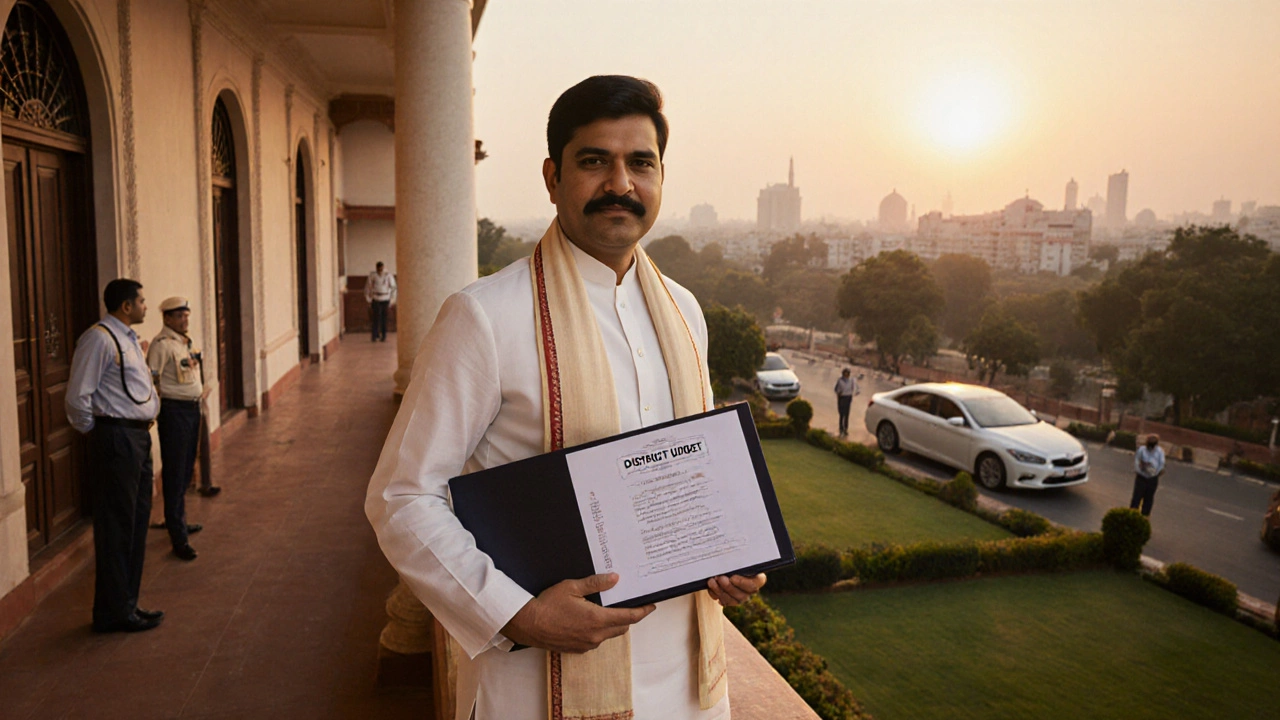Government Job Salary Estimator
How Your Government Job Compensation Works
Total compensation isn't just your base salary. It includes allowances, housing, medical benefits, and other perks that can add 40-60% to your overall value.
- Base salary is just the start
- Location affects your allowances significantly
- Seniority and responsibilities drive pay growth
- Non-cash benefits can be worth 30-60% of your total value
Your Salary Estimate
Your Total Compensation
If you're asking which government job is best for money, you're not alone. Thousands of people in India chase government roles every year-not just for job security, but because some of these positions pay more than private sector jobs at the same level. The truth? Not all government jobs are created equal when it comes to salary. Some pay like corporate managers. Others barely cover rent in a metro city. Let’s cut through the noise and show you exactly which government jobs pay the most right now in 2025.
Top 5 Highest Paying Government Jobs in India (2025)
Here are the five government roles that consistently top the salary charts, based on latest pay commission data from the 7th Pay Commission and updated allowances as of 2025.
- Indian Administrative Service (IAS) - Starting pay: ₹56,100/month, with allowances, this jumps to ₹1.2-1.8 lakh/month in senior roles. District Magistrates in high-cost cities like Mumbai or Delhi earn over ₹2 lakh/month after all perks. Plus, free housing, transport, medical, and even household staff.
- Indian Police Service (IPS) - Similar pay scale to IAS. Senior IPS officers, especially those posted in states with high crime or terrorism risks, get additional risk allowances. A Deputy Inspector General can earn ₹1.5 lakh+ monthly.
- Indian Foreign Service (IFS) - This is the dark horse. IFS officers posted in the US, UK, or UAE get foreign allowances that can push total compensation to ₹3-5 lakh/month. Housing, schooling for kids, and travel are fully covered. A Joint Secretary in the Ministry of External Affairs earns ₹2.2 lakh base + ₹1.5 lakh in foreign allowance.
- Reserve Bank of India (RBI) Grade B Officer - Base salary: ₹77,000/month. With allowances, housing, and performance bonuses, total take-home hits ₹1.4-1.8 lakh/month. Plus, job stability and pension benefits match IAS.
- Indian Revenue Service (IRS) - Income Tax & Customs - IRS officers in senior positions (Assistant Commissioner and above) earn ₹1.3-1.9 lakh/month. Add in non-cash benefits like government vehicles, fuel, and medical coverage, and the real value is higher than the salary suggests.
Why These Jobs Pay More Than Others
Not all government jobs have the same pay structure. Why do IAS, IFS, and RBI jobs pay so much more than, say, a post office clerk or a state government teacher?
It comes down to three things: responsibility level, risk, and international exposure.
IAS officers control district budgets worth hundreds of crores. They make decisions that affect millions. That’s why their pay is structured like a senior executive. IFS officers represent India abroad-often in expensive cities. The government doesn’t want them struggling to afford rent or school fees. So they’re paid to live like local professionals.
RBI Grade B officers handle monetary policy, regulate banks, and manage India’s foreign reserves. Their work directly impacts inflation, interest rates, and the rupee’s value. That’s not a desk job-it’s a high-stakes role.
Compare that to a Group C government job like a Lower Division Clerk (LDC) or a State PSC officer. Their pay is fixed, no foreign postings, no risk allowances. Base salary: ₹25,000-35,000/month. That’s still better than many private jobs, but it’s not in the same league as the top roles.
What About PSU Jobs? Do They Pay More?
Public Sector Undertakings (PSUs) like ONGC, NTPC, IOCL, and SBI often get mentioned alongside IAS as high-paying government jobs. But here’s the catch: PSUs are government-owned, not government-service jobs.
Still, they pay well. An Executive Trainee at ONGC starts at ₹1.2 lakh/month. With performance bonuses and field allowances, experienced engineers can hit ₹2.5-3 lakh/month. That’s higher than most IAS officers in early postings.
But here’s the trade-off: PSUs don’t offer the same prestige or long-term power. You can’t become a Minister from an ONGC job. You won’t get a government bungalow or a state security detail. Your career is tied to the company’s performance. If the oil price crashes, bonuses shrink.
So if you want money + power + lifelong status, go IAS/IFS. If you want pure money + technical growth + early retirement, go PSU.

Hidden Perks That Make These Jobs Worth More Than the Salary
Salary isn’t everything. Many people overlook the non-cash benefits that add up to 40-60% of your total compensation.
- Free housing - IAS/IPS officers get government quarters in metro cities. Rent for a 3BHK in Delhi or Mumbai? ₹80,000-1.5 lakh/month. That’s free.
- Transport - Official cars with drivers, fuel, maintenance covered. Even for personal use in many cases.
- Medical coverage - Full family coverage under CGHS (Central Government Health Scheme). No insurance premiums. No co-pays.
- Education for kids - Government schools for children of officers, or reimbursement for private school fees up to ₹2 lakh/year.
- Pension - 50% of last drawn salary for life. Plus, family pension if you pass away. That’s a ₹75,000/month pension for a ₹1.5 lakh salary officer.
- Leave benefits - 30 days casual leave, 30 days earned leave, 15 days sick leave, plus 120 days of paid study leave. You can take 2-3 months off every year if planned right.
When you add all these up, an IAS officer earning ₹1.8 lakh/month is actually living on ₹3 lakh worth of compensation. That’s more than most private sector VPs.
How to Get Into These High-Paying Jobs
There’s no shortcut. These jobs require clearing the UPSC Civil Services Exam for IAS, IPS, IFS, and IRS. RBI Grade B requires clearing the RBI Grade B exam. PSU jobs need GATE or PSU-specific exams.
Here’s what it takes:
- UPSC Civil Services Exam - 3 stages: Prelims (MCQ), Mains (9 written papers), Interview. Takes 1-2 years of serious preparation. Only 0.1% of applicants make it.
- RBI Grade B - 2 stages: Phase 1 (General, English, Quant, Reasoning), Phase 2 (Economic & Social Issues, English Writing, Finance & Management). Less competitive than UPSC, but still tough.
- PSU Recruitment - Based on GATE score (for engineers) or written test + interview. ONGC, IOCL, and NTPC hire 5,000+ engineers yearly.
If you’re starting now, aim for UPSC. It’s the hardest path, but it opens the door to the highest-paying and most powerful government roles.

What If You Don’t Clear UPSC? Alternatives That Still Pay Well
Not everyone cracks UPSC. And that’s okay. There are other high-paying government jobs you can aim for:
- State Public Service Commission (PSC) Officers - Like IAS but at state level. Pay is lower (₹80,000-1.3 lakh/month), but competition is less intense.
- SSC CGL Group B Officers - Posts like Assistant Audit Officer, Assistant Enforcement Officer. Pay: ₹60,000-90,000/month. Requires SSC CGL exam. Much easier than UPSC.
- Indian Coast Guard / Navy / Air Force Officers - Through NDA or CDS. Starting pay: ₹70,000-80,000/month. With flying/sea allowances, can hit ₹1.2 lakh/month.
- Bank PO (SBI, IBPS) - Starting salary ₹50,000-60,000/month. Promotions after 3-5 years can take you to ₹1 lakh+.
These aren’t as prestigious as IAS, but they’re solid, stable, and pay better than 90% of private sector jobs.
Myth Busting: “Government Jobs Are Slow-Paced and Low-Paying”
This myth comes from people who only know about clerical or Group D jobs. Yes, a peon in a government office earns ₹18,000/month. But that’s not the whole picture.
The top 5% of government jobs pay more than top 10% of private sector jobs. And they come with less stress, no layoffs, and better work-life balance.
Compare an IAS officer managing a district to a corporate manager at a tech firm. The IAS officer has less pressure to hit quarterly targets. No investor meetings. No stock market crashes. No layoffs. You get paid the same whether the economy is up or down.
That’s the real value: financial security with high pay.
Which government job has the highest salary in India?
The Indian Foreign Service (IFS) offers the highest total compensation, especially for officers posted in the US, UK, or UAE. With foreign allowances, total monthly pay can reach ₹3-5 lakh. IAS and RBI Grade B officers follow closely, with top earners making ₹2-2.5 lakh/month in base pay plus allowances.
Is RBI Grade B better than IAS?
It depends on your goal. RBI Grade B pays more in the early years (₹1.4-1.8 lakh/month) and offers technical growth. IAS pays slightly less initially but grows faster with promotions and offers power, influence, and lifelong status. IAS officers can become Cabinet Secretaries or Chief Secretaries. RBI officers stay in finance roles. Choose IAS for leadership, RBI for expertise.
Do PSU jobs pay more than IAS?
Yes, in the early career stage. An ONGC or IOCL engineer can earn ₹2.5-3 lakh/month after 5-7 years, higher than most IAS officers at the same experience level. But IAS offers long-term growth, pensions, and non-monetary power. PSUs don’t offer ministerial roles or administrative authority. So PSU = higher pay early; IAS = higher status and long-term security.
What is the easiest government job to get with high pay?
SSC CGL Group B posts like Assistant Audit Officer or Assistant Enforcement Officer are among the easiest high-paying options. The exam is less competitive than UPSC, and salary starts at ₹60,000/month. With promotions, you can hit ₹90,000+ in 5 years. It’s a realistic target for serious aspirants who don’t want to spend 3-4 years preparing for UPSC.
Are government jobs worth it in 2025?
Absolutely-if you aim for the right ones. The top government jobs offer salaries that rival or beat private sector leaders, with zero job risk, full medical coverage, housing, and lifelong pension. In a volatile economy, this stability is priceless. If you’re willing to study hard for UPSC, RBI, or SSC, the return on your effort is among the highest in India.
